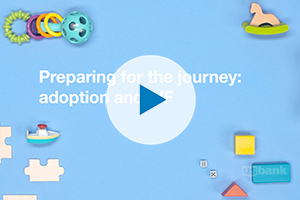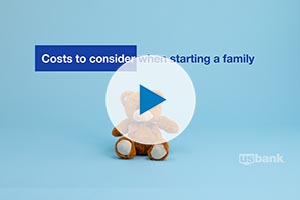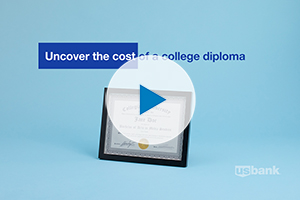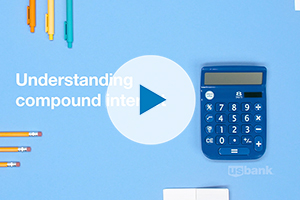
Costs to consider when starting a business

How to choose the right business savings account

Does your side business need a separate bank account?

5 financial goals for the new year

How to track your spending patterns

How to manage your money: 6 steps to take

Key components of a financial plan

Should rising interest rates change your financial priorities?

How to manage your finances when you're self-employed

Good money habits: 6 common money mistakes to avoid

Retirement expectations quiz

Healthcare costs in retirement: Are you prepared?

The connection between your health and financial well-being

Is a Health Savings Account missing from your retirement plan?

Transitioning from the military to the civilian workforce

Saving vs. investing: What's the difference?

3 steps to prepare for a medical emergency

How to Adult: 5 ways to track your spending

Preparing for adoption and IVF

11 essential things to do before baby comes

Webinar: Uncover the cost: Starting a family

Family planning for the LGBTQ+ community

College budgeting: When to save and splurge

Webinar: Uncover the cost: College diploma

How to gain financial independence from your parents

How to save money in college: easy ways to spend less

Practical money skills and financial tips for college students

Tips for handling rising costs from an Operation HOPE Financial Wellbeing coach

3 financial tools to help automate your finances

3 ways to keep costs down at the grocery store (and make meal planning fun)

5 tips for creating (and sticking to) a holiday budget

Financial checklist: Preparing for military deployment

Should you buy now, pay later?

6 pandemic money habits to keep for the long term

5 things to consider when deciding to take an unplanned trip

Working with an accountability partner can help you reach your goals

The mobile app to download before summer vacation

Webinar: 5 myths about emergency funds

How to decide when to shop local and when to shop online

How I kicked my online shopping habit and got my spending under control

Growing your savings by going on a ‘money hunt’

Webinar: Smart habits and behaviors to achieve financial wellness

A who’s who at your local bank

Your 4-step guide to financial planning

5 myths about emergency funds

How to stay financially focused in the face of economic uncertainty

How I did it: Learned to budget as a single mom

What military service taught me about money management

Does your savings plan match your lifestyle?

Webinar: Common budget mistakes (and how to avoid them)

Webinar: Uncover the cost: Wedding

Webinar: Uncover the cost: International trip

Adulting 101: How to make a budget plan

How having savings gives you peace of mind

Allowance basics for parents and kids

Are savings bonds still a thing?

Tips to overcome three common savings hurdles

Helpful tips for safe and smart charitable giving

Webinar: Mindset Matters: How to practice mindful spending

How to save money while helping the environment

You can take these 18 budgeting tips straight to the bank

How to manage money in the military: A veteran weighs in

How can I help my student manage money?

U.S. Bank asks: Do you know what an overdraft is?

Stay on budget — and on the go — with a mobile banking app

U.S. Bank asks: Do you know your finances?

Do you and your fiancé have compatible financial goals?

3 tips for saving money easily

How to best handle unexpected expenses

Save time and money with automatic bill pay

U.S. Bank asks: Transitioning out of college life? What’s next?

Which is better: Combining bank accounts before marriage — or after?

Personal finance for teens can empower your child

Don’t underestimate the importance of balancing your checking account

9 simple ways to save

How to save for a wedding

It's possible: 7 tips for breaking the spending cycle

Here’s how to create a budget for yourself

Multiple accounts can make it easier to follow a monthly budget

7 steps: How couples and single parents can prepare for child care costs

Checking and savings smarts: Make your accounts work harder for you

Dear Money Mentor: How do I set and track financial goals?

Tips for working in the gig economy

How compound interest works

5 tips for parents opening a bank account for kids

Lost job finance tips: What to do when you lose your job

Myths vs. facts about savings account interest rates

Tips to raise financially healthy kids at every age

Money management guide to financial independence

Money Moments: 8 dos and don’ts for saving money in your 30s

30-day adulting challenge: Financial wellness tasks to complete in a month

7 financial questions to consider when changing jobs

First-timer’s guide to savings account alternatives

What’s in your emergency fund?

Travel for less: Smart (not cheap) ways to spend less on your next trip

Certificates of deposit: How they work to grow your money

What I learned from my mom about money

Practical money tips we've learned from our dads

How to cut mindless spending: real tips from real people

6 ways to spring clean your finances and save money year-round

Dear Money Mentor: How do I pick a savings or checking account?

What financial advice would you give your younger self?

Bank from home with these digital features

Building a financial legacy for your family and community

How to increase your savings

Financial gifts can be a valuable – and fun – choice for the holidays

Consolidating debts: Pros and cons to keep in mind

How to use your unexpected windfall to reach financial goals

Military homeownership: Your guide to resources, financing and more

Spring cleaning checklist for your home: 5 budget-boosting tasks

Saving for a down payment: Where should I keep my money?

Are professional movers worth the cost?

Beyond the mortgage: Other costs for homeowners

Webinar: Uncover the cost: Home renovation

Improving your credit score: Truth and myths revealed

How I did it: Deciding whether to buy an RV


